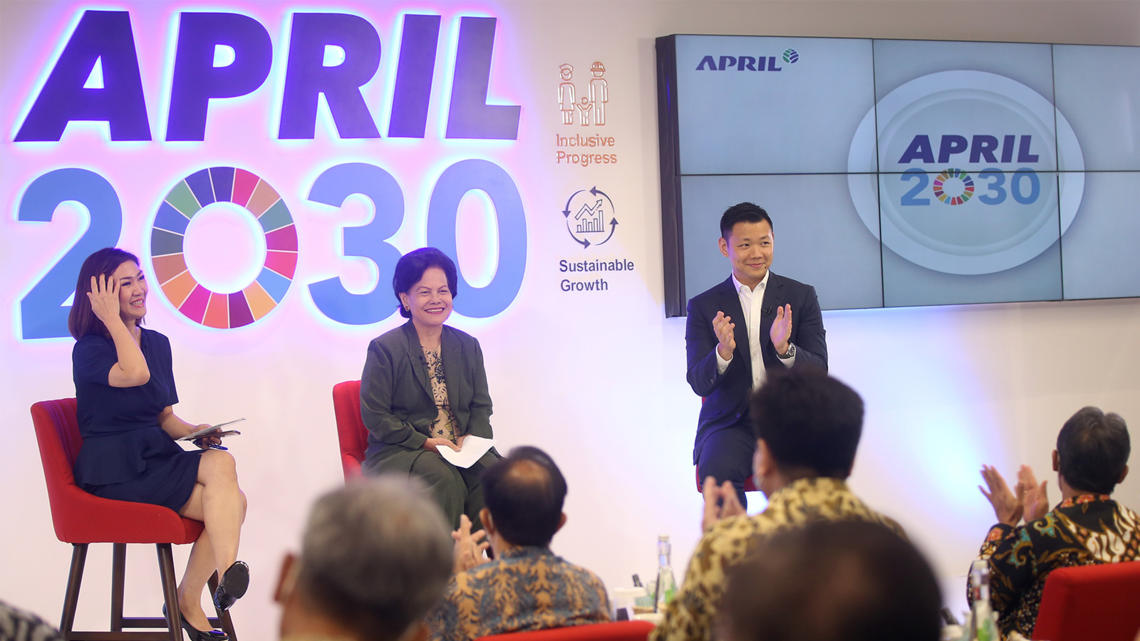Jakarta, 17 November2020: Leading global producer of sustainable fiber and bio-based products, Asia Pacific Resources International Limited (APRIL), has announced a slate of progressive targets to 2030 that will have a positive impact on climate, nature and people while transforming its business.
Supporting the achievement of the Sustainable Development Goals in Indonesia, APRIL2030targets a drastic reduction of carbon emissions to achieve net zero emissions from land use and a 25% cut in product carbon emissions. The company also commits to net zero loss of protected areas and measurable gains in biodiversity and ecosystem benefits in the conservation and restoration areas under its active management.
APRIL2030 will drive vital inclusive progress in Indonesia’s developing economy through transformative initiatives in livelihoods, education, healthcare and championing equal opportunity for women. The company also commits to embracing circularity in its business and the use of recycled textiles as an alternative fiber source.
Announcing the 2030 commitments and targets, RGE Director Anderson Tanoto said: “Continued investment in climate, nature and sustainable development assumes even greater urgency if the global economy is to achieve a strong recovery from the impacts of COVID-19. As challenging as the current situation is, it presents businesses with an opportunity, if seized decisively, to boldly transform the future for the better. “We are determined to ensure the next decade is one of action and further transformation for our company as we play our part to achieve a lower carbon economy and make a positive impact on climate, nature and people.”APRIL2030 includes a series of concrete, time-bound and science-based targets structured around four core commitments:
- Climate Positive includes four targets that will drastically reduce and mitigate carbon emissions based on science-based solutions, including net zero emissions from land use and 25% less product carbon emissions. These will be achieved through investment in technology, enhancement of operating systems and sourcing most of the mill and fibre operation’s energy needs from cleaner, renewable energy. Net zero emissions from land use will be achieved by implementing mitigation solutions across APRIL’s concessions, including those on peatland, and minimising emissions in fiber plantation operations.
- Thriving Landscapes includes six targets to champion conservation and biodiversity, aligned with the growing call for science-based target setting for nature. APRIL targets net zero loss in protected areas and significant enhancements in biodiversity and other ecosystem benefits. Related to this is the target to support wildlife protection and conservation in Indonesia, in support of the Indonesian government and in partnership and collaboration with other parties. It will also extend its conservation and restoration commitment to support other initiatives through partnerships and collaboration. Another critical target is to achieve 50% increase in fiber productivity through intensification and investments in silviculture and tropical peatland science. Achievement of these will be made possible through an average annual funding of $10 million to be invested in nature that is guaranteed by APRIL’s production-protection approach.
- Inclusive Progress includes five targets to empower people and communities through transformative initiatives in healthcare, education and the championing of equal opportunity for women. Extreme poverty in APRIL’s communities will be eradicated within a 50 km radius of its operations while education and universal access to essential and affordable healthcare will be boosted. As part of this, APRIL will focus on reducing the prevalence of stunting by 50% among children below 5 years of age in Riau Province and will work to boost women’s effective social and economic participation through opportunities for employment and advancement within the company.
- Sustainable Growth includes three targets on diversification, circularity and responsible production as strategies for sustainable business growth. This will include increasing material efficiency and chemical recovery, using less water per product tonne and reducing solid waste to landfill. As part of investments in research and innovation on next-generation fiber, APRIL targets to source up to 20%of cellulosic fiber for viscose from recycled textiles.
APRIL Group President Praveen Singhavi added: “We’re making these 2030 commitments from a developing economy where the responsibility to achieve sustainable business growth and deliver essential progress for communities is greater than ever. No company’s sustainability vision can be enduring if communities are left behind.”
In an immediate move to deliver and take action, APRIL is in advanced discussion on a cooperation with Wildlife Conservation Society on wildlife protection and conservation in Indonesia, including of endangered species, in support of the Indonesian Government’s biodiversity goals. This is in addition to the ongoing collaboration with long-time partner Fauna & Flora International on the Riau Ecosystem Restoration (RER) initiative. A new tropical peatland science hub has been established at the RER Eco-Research Camp on Riau’s Kampar Peninsula that will serve as a hub for national and international scientists and academics and for stakeholders who wish to experience ecosystem restoration work on the ground. APRIL has also signed up with the Science-Based Target Initiative (SBTi) and will work to set a science-based emission reduction target aligned with the SBTi’s target-setting criteria.
To immediately kick off the company’s shift to renewable energy sources, as part of the commitment to reduce its carbon emissions, APRIL will be installing 20MW solar panels at its operational sites starting in 2021. When completed in 2025, this will be one of the largest, private sector, solar panel installations in Indonesia.
“APRIL2030 is about taking ownership of our agenda and proactively defining how we evolve our sustainability commitments to make them even more relevant to the greatest challenges of our times. We have this critical window of the next 10 years to work collectively and make this truly a decade of decisive action,” said Lucita Jasmin, Director of Sustainability and External Affairs.
APRIL2030 builds on the company’s existing Sustainable Forest Management Policy 2.0 which the company will continue to implement under the independent scrutiny of its Stakeholder Advisory Committee.
More information available on APRIL 2030 website
And check out the video of the announcement: https://www.youtube.com/watch?v=DxTmHe34cWI


